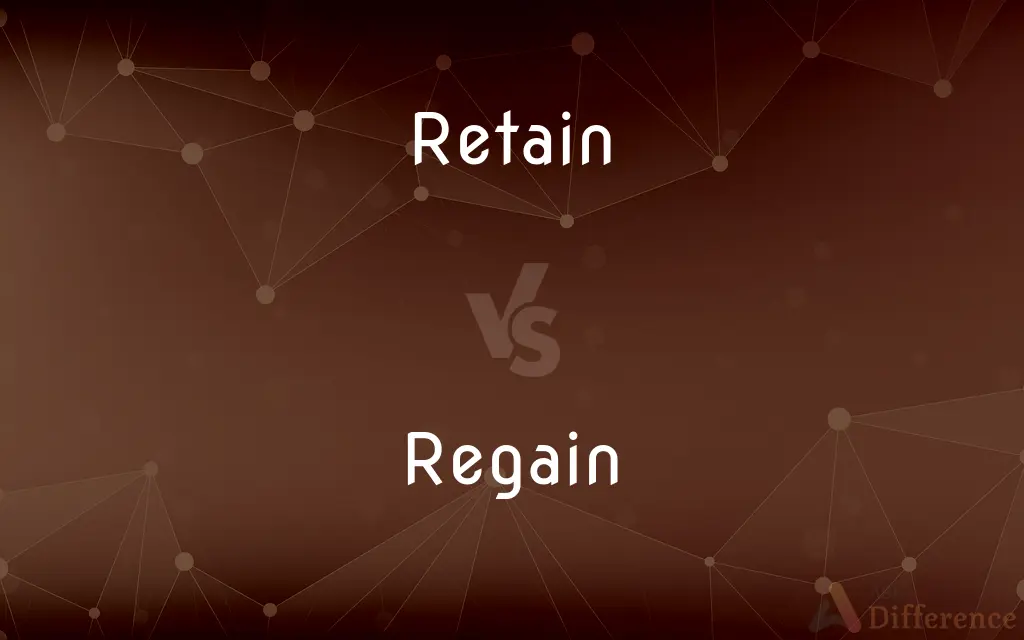Retain vs. Regain — What's the Difference?
By Tayyaba Rehman & Fiza Rafique — Updated on March 2, 2024

Difference Between Retain and Regain
Table of Contents
ADVERTISEMENT
Key Differences
Retain focuses on the continuation of possession, status, or condition, emphasizing the act of holding onto something without letting it go. For instance, a company aims to retain its customers by providing excellent service, indicating ongoing efforts to keep something one already has. Whereas regain is about recovery or retrieval of something that was once lost or diminished. For example, regaining trust implies that trust was lost and efforts are necessary to restore it, highlighting a process of reclaiming what was once possessed.
While retaining is often a proactive process involving strategies to maintain the current state of affairs, regaining is reactive, necessitating actions to recover what was lost. Retaining can apply to tangible objects, such as retaining documents for future reference, and intangible concepts, like retaining information after studying. On the other hand, regaining often involves a sense of restoration or healing, such as regaining health after an illness or regaining peace in a community after disturbances.
The concept of retain implies a level of control and stability, suggesting that with the right measures, one can prevent loss or deterioration. In contrast, regain acknowledges a disruption or loss, with the focus shifting towards the effort required to return to a previous state or condition.
Retention strategies are crucial in various fields, from human resources (retaining employees) to customer service (retaining clients), highlighting the importance of ongoing satisfaction and engagement. Meanwhile, strategies to regain something involve understanding the reasons behind the loss and implementing measures to address these issues, whether it’s regaining market share or restoring a damaged reputation.
Both retaining and regaining play crucial roles in personal development, business, and relationships. Retaining emphasizes consistency and prevention, while regaining focuses on recovery and correction, each process reflecting a different aspect of managing and responding to change.
ADVERTISEMENT
Comparison Chart
Definition
To keep possession or maintain a status
To recover something lost or diminished
Focus
Continuation and maintenance
Restoration and recovery
Process
Proactive measures to prevent loss
Reactive measures to restore loss
Application
Tangible and intangible possessions
Often relates to lost or diminished states
Strategy
Involves maintaining current conditions
Involves correcting or overcoming issues
Examples
Retaining knowledge, retaining customers
Regaining trust, regaining strength
Compare with Definitions
Retain
Continue to hold.
Companies offer benefits to retain employees.
Regain
Recapture.
Regain control of a meeting that has gone off-topic.
Retain
Maintain condition.
Athletes train regularly to retain their physical fitness.
Regain
Heal or mend.
Regain health after a period of illness with proper care.
Retain
Preserve from loss.
Applying a sealant to retain the wood's natural color.
Regain
Restore to a former state.
Efforts to regain the public’s trust can take years.
Retain
Keep possession.
Retain important documents for future reference.
Regain
Reacquire.
Regain possession of a property after legal proceedings.
Retain
Remember information.
Using mnemonic devices helps students retain information.
Regain
Recover what was lost.
Regain lost confidence through positive affirmations.
Retain
To keep possession of; continue to have
The family sold the house but retained the land.
Regain
To recover possession of (something lost or taken away); get back
Regained lost territory.
Regained their market share.
Regained the lead in the game.
Retain
To keep in a particular place or condition
A library that retains the author's papers.
Plants that retain a lot of water.
Regain
To occupy again
Regained his seat at the table.
Retain
To continue to have as a feature or aspect
Retains his good humor after all the setbacks.
Regain
To have (the use or control of something) restored; get back
Regained the ownership of the team.
Retain
To keep in mind; remember
Retains the songs she learned in childhood.
Regain
To have the use of (a faculty, ability, or desirable condition) restored; be restored to (a normal or desirable condition)
Regained his balance.
Regained her confidence.
Regained their privacy.
Retain
To keep in one's service or pay
Retain employees on a workforce.
Regain
To add back (body weight that has been lost).
Retain
To hire a person for (that person's services)
Retained the best legal advice available.
Regain
To manage to reach again
Regained the summit.
Retain
Keep in one's mind;
I cannot retain so much information
Regain
To gain anew; to get again; to recover, as what has escaped or been lost; to reach again.
Regain
Get or find back; recover the use of;
She regained control of herself
She found her voice and replied quickly
Regain
Come upon after searching; find the location of something that was missed or lost;
Did you find your glasses?
I cannot find my gloves!
Common Curiosities
Why is retention important in businesses?
Retention is crucial for sustaining growth, as it costs less to retain existing customers or employees than to acquire new ones.
What does it mean to retain something?
To retain something means to keep it in your possession or maintain its condition over time.
Can you regain something you never had?
Typically, regaining implies getting back something previously possessed, so one cannot regain what was never had.
How can one regain lost trust?
Regaining lost trust involves demonstrating reliability, honesty, and integrity over time to restore confidence.
Is it possible to regain physical fitness after a long period of inactivity?
Yes, with appropriate exercise and nutrition, one can regain physical fitness, though the time and effort required can vary.
What are some strategies to retain information?
Strategies include regular review, practical application, and teaching the information to others.
Is retaining or regaining more challenging?
The challenge varies; retaining requires consistent effort to prevent loss, whereas regaining involves overcoming obstacles to restore what was lost.
How do emotions affect the ability to retain or regain?
Emotional states can significantly impact both processes; positive emotions can enhance retention and facilitate the regaining process.
What psychological factors influence the ability to retain and regain?
Motivation, self-efficacy, and resilience can significantly influence both retaining information and regaining lost abilities or positions.
What role does feedback play in retaining and regaining?
Feedback is vital for identifying areas of improvement, helping to maintain standards for retention and guiding corrective actions for regaining.
Can technology help in retaining and regaining?
Yes, technology can support both processes through reminders, tracking progress, and providing platforms for engagement and recovery activities.
Can retention strategies help in regaining something?
Indirectly, yes; effective retention can prevent loss, reducing the need to regain later. However, specific strategies may differ between retaining and regaining.
Can a business regain a lost market position?
Yes, through strategic planning, innovation, and addressing past shortcomings, a business can regain a lost market position.
How does the concept of time relate to retaining and regaining?
Time is a critical factor; retaining often requires ongoing effort, while regaining involves overcoming past losses, each with its own temporal challenges.
How does culture influence retention and regaining efforts?
Cultural values and norms can shape what is prioritized for retention and the methods deemed appropriate for regaining.
Share Your Discovery

Previous Comparison
Superimposable vs. Superposable
Next Comparison
Installation vs. FabricationAuthor Spotlight
Written by
Tayyaba RehmanTayyaba Rehman is a distinguished writer, currently serving as a primary contributor to askdifference.com. As a researcher in semantics and etymology, Tayyaba's passion for the complexity of languages and their distinctions has found a perfect home on the platform. Tayyaba delves into the intricacies of language, distinguishing between commonly confused words and phrases, thereby providing clarity for readers worldwide.
Co-written by
Fiza RafiqueFiza Rafique is a skilled content writer at AskDifference.com, where she meticulously refines and enhances written pieces. Drawing from her vast editorial expertise, Fiza ensures clarity, accuracy, and precision in every article. Passionate about language, she continually seeks to elevate the quality of content for readers worldwide.














































